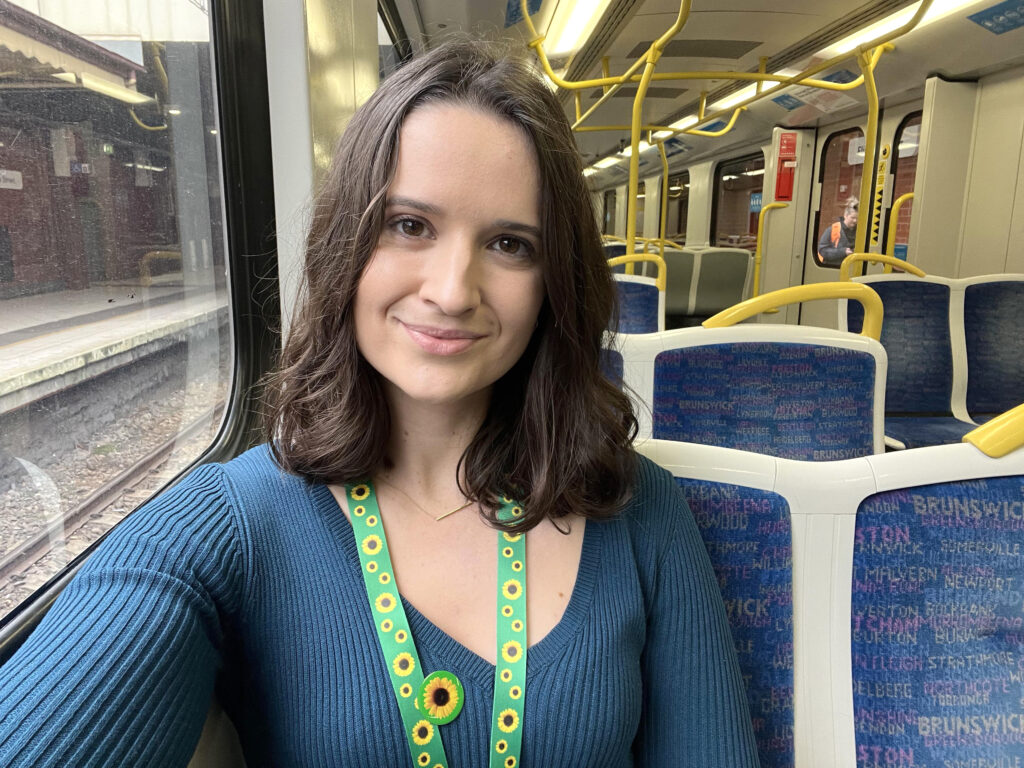By Kate May Ditchburn
This post contains themes of ableism.
It’s Monday morning and I’m on my way to work in the thick of Melbourne’s peak hour. My back is aching, my head is throbbing. I’m silently hoping, begging, there’ll be a seat for this 30-minute trip. As the doors of the train open and I’m greeted by a sea of people, all my hope is gone. I take a deep breath, make my way into the crowd, and put my game face on. I’m having a particularly bad flare day – a day where all my symptoms are dialled up to severe. In addition to my spinal and head pain, the whole right side of my body is numb. I stand in the middle of the train, relying solely on my left foot for balance. I’m already exhausted and my day is only beginning.
I look around and think about asking for someone’s seat. I picture squeezing my way through the crowd, breaking a tired commuter’s concentration and asking politely to trade places. I worry it will be yet another person who responds with confusion or frustration, after all, I look just like them – a young professional heading into the daily grind. I’ve seen it before. They wonder why they should give up their seat for me – I’m not old, pregnant, or obviously disabled. Why should I get special treatment?
And what will I say if they ask why I need their seat? I doubt they’ve ever heard of my condition and I really don’t want to give a lengthy explanation of the complex and debilitating nature of it, or what a bad flare day means. When you have chronic illness, you must fight every day for the things you need just to make it through. It’s not just the symptoms. It’s the countless appointments, unsuccessful medical interventions, unsolicited health advice from your peers, and widespread lack of understanding in society that makes it easier to just withdraw and soldier on alone.
No, I don’t think I’ll ask for help today.
As someone who has lived with chronic illnesses for most of my adult life, this is a standard scenario for me. So, you can imagine my surprise when I learn of a public initiative specifically for people like me. Enter, the Hidden Disabilities Sunflower program!
The Hidden Disabilities Sunflower is a voluntary tool that enables you to share with others that you have a disability or condition that may not be immediately apparent. It’s a simple signal that you may need support, awareness and understanding. Beginning in England’s’ Gatwick Airport in 2016, the initiative has recently taken off in Melbourne. Entities including Metro Trains, Melbourne Airport, Melbourne Cricket Ground, City of Melbourne, Stockland, and Mornington Peninsula Shire are getting on board, with many offering free Sunflower products and training their staff in disability support.
Seeing this movement grow in my home city has meant a lot to me. The public acknowledgement of hidden disabilities is bringing much-needed attention to the growing number of people who face the same problems I face. This is by no means a small cohort. One in six Australians live with a disability, and three-quarters of them report that their main health condition includes musculoskeletal conditions, hearing loss, heart disease, and nervous system conditions. These and many other conditions are not widely visible or well understood by the general public. Yet all are united together in the Hidden Disabilities Sunflower initiative. All those people who may struggle for support, awareness and understanding of their health needs are included.
It may seem like just another branded lanyard and badge, but for now, I feel seen.
Kate May Ditchburn is a public health consultant from Melbourne. She holds a Bachelor of Journalism and a Master of Health Promotion. Kate lives with fibromyalgia, complex migraine and functional digestive disorders. Through her personal and professional experiences in the health sector, Kate passionately advocates for greater understanding and support for those with chronic illness. Follow her on LinkedIn, Instagram and Twitter for more.

